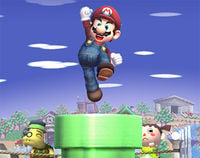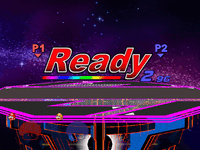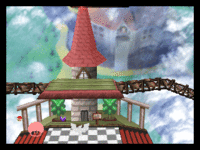On-screen appearance: Difference between revisions
Max Carter (talk | contribs) No edit summary |
Max Carter (talk | contribs) No edit summary |
||
| Line 9: | Line 9: | ||
*In ''Brawl'', ''Smash 4'', and ''Ultimate'', all fighters have unique animations as in ''Smash 64'', but they are only used in multiplayer modes; in single-player modes, such as [[Target Smash!!]], the fighters will already be present on the field. | *In ''Brawl'', ''Smash 4'', and ''Ultimate'', all fighters have unique animations as in ''Smash 64'', but they are only used in multiplayer modes; in single-player modes, such as [[Target Smash!!]], the fighters will already be present on the field. | ||
As the announcer counts down before a match starts, the camera will either pan far enough away from the stage to show each entrance or zoom in on each character during the first few frames of their entrance. In {{for3ds}}, when a match starts, the screen will occasionally focus on the player's own on-screen appearance for the entire duration of the countdown, rather than moving between each character as they appear or showing the entire screen.<ref>http://youtu.be/eOEo0A7zVMU?t=5m51s</ref> In {{forwiiu}}, the camera might | As the announcer counts down before a match starts, the camera will either pan far enough away from the stage to show each entrance or zoom in on each character during the first few frames of their entrance. In {{for3ds}}, when a match starts, the screen will occasionally focus on the player's own on-screen appearance for the entire duration of the countdown, rather than moving between each character as they appear or showing the entire screen.<ref>http://youtu.be/eOEo0A7zVMU?t=5m51s</ref> In {{forwiiu}}, the camera might not focus on every character. In fact, it may even focus on just one, depending on how many people are playing. | ||
It usually has no effect whatsoever on gameplay other than visually dramatic and comedic purposes. The exceptions to this rule are Zero Suit Samus's entrance in ''Brawl'', which allows the players to hit their opponents with the fallen pieces of the power suit, and Olimar's entrance, which automatically has him [[Pikmin Pluck|pluck]] three Pikmin. Each entrance usually relates to that character's universe, such as [[Mario]] entering in through a warp pipe the way he does at the beginning of ''{{s|mariowiki|Super Mario 64}}''. | It usually has no effect whatsoever on gameplay other than visually dramatic and comedic purposes. The exceptions to this rule are Zero Suit Samus's entrance in ''Brawl'', which allows the players to hit their opponents with the fallen pieces of the power suit, and Olimar's entrance, which automatically has him [[Pikmin Pluck|pluck]] three Pikmin. Each entrance usually relates to that character's universe, such as [[Mario]] entering in through a warp pipe the way he does at the beginning of ''{{s|mariowiki|Super Mario 64}}''. | ||
Revision as of 05:44, August 24, 2021

The on-screen appearance, also known as an intro or entrance and as Entry (or EntryL and EntryR) internally, is a minor feature in Super Smash Bros., Super Smash Bros. Brawl, Super Smash Bros. 4 and Super Smash Bros. Ultimate. It includes a small animation unique for each character entering the battlefield during the countdown before the match begins.
Where exactly on-screen appearances are used depends on the game:
- In Smash 64, they are used in VS Mode and the standard matches in 1P Game; in all three Bonus Stages and the battle with Master Hand, the player's character will already be on the stage.
- In Melee, all fighters have a shared animation of becoming animated from their trophy forms, as seen in the opening movie; this animation appears in all modes.
- In Brawl, Smash 4, and Ultimate, all fighters have unique animations as in Smash 64, but they are only used in multiplayer modes; in single-player modes, such as Target Smash!!, the fighters will already be present on the field.
As the announcer counts down before a match starts, the camera will either pan far enough away from the stage to show each entrance or zoom in on each character during the first few frames of their entrance. In Super Smash Bros. for Nintendo 3DS, when a match starts, the screen will occasionally focus on the player's own on-screen appearance for the entire duration of the countdown, rather than moving between each character as they appear or showing the entire screen.[1] In Super Smash Bros. for Wii U, the camera might not focus on every character. In fact, it may even focus on just one, depending on how many people are playing.
It usually has no effect whatsoever on gameplay other than visually dramatic and comedic purposes. The exceptions to this rule are Zero Suit Samus's entrance in Brawl, which allows the players to hit their opponents with the fallen pieces of the power suit, and Olimar's entrance, which automatically has him pluck three Pikmin. Each entrance usually relates to that character's universe, such as Mario entering in through a warp pipe the way he does at the beginning of Super Mario 64.
Lists of on-screen appearances
In Super Smash Bros. Melee

Unique on-screen appearances were removed in Melee. Instead, all playable characters briefly start as trophies that "come to life" while the announcer says "Ready... go!". Only Master Hand and Crazy Hand have "true" on-screen appearances, where they both gradually enter the stage from the background, laughing.
Sheik has the same on-screen appearance as every other character, but it should be noted that the sound played when Zelda transforms into Sheik is played when Sheik appears at the start of the match.
Giga Bowser, when fought in The Showdown and Adventure Mode, has no on-screen appearance of any type; when the countdown starts, he's already standing on the stage, although he does have an introduction clip before being fought in Adventure Mode, which consists of Giant Bowser's trophy being flung back onto the stage, transforming into Giga Bowser. Taking advantage of hacks, Giga Bowser may be fought in Vs. Mode. He then appears as a trophy when the "Must be ON" code from Action Replay is not turned on. When this happens, he will be in a T-pose upon trophy appearance. This freezes on stages that are not part of the Smash universe. The CPU players, including allies, in Event matches are already in the fight when the countdown starts. In Event 50: Final Destination Match, the hands' "true" appearances don't occur; they are already in the fight.
Trivia
- In Super Smash Bros. for Nintendo 3DS, if there is at least one human player in the battle, then only Player 1's on-screen appearance will be focused on onscreen, before showing the other fighters standing in place. However, if the battle consists of only CPUs then all on-screen appearances will be shown one after another.
- When in a battle to unlock a fighter, however, the opposing fighter's on-screen appearance is focused on onscreen instead.
- Link, Zero Suit Samus, and Sheik are the only characters to change their on-screen appearance.
- Of these, Link is the only one not to change from Brawl to SSB4. Link is also the only one to change in multiple games.
- In Super Smash Bros. Brawl, there was a small error regarding Toon Link's entrance. If one looks closely at the explosion, one can clearly see that both his sword and shield are not sheathed even though they should be. This was fixed in Super Smash Bros. 4.
- Although Little Mac's entrance animation shows him flinging off his pink sweatshirt, he does not do so if his currently chosen palette swap has him wearing it permanently (both wireframe and non-wireframe versions included). More interestingly, in Super Smash Bros. for Nintendo 3DS, Little Mac's gloves only change color to match his currently chosen palette swap after he throws his sweatshirt off, meaning he always enters the stage wearing green gloves and a pink hoodie when not using a wireframe costume, and pink gloves with a green hoodie when using a wireframe costume.
- Mario, Luigi, Peach, Snake, Pokémon Trainer, and Ken are the only characters that speak during their on-screen appearance.
- Of these characters, Snake is the only one not to always speak during his on-screen appearance. This only applies in Brawl.
- Pokémon Trainer has different lines depending on which Pokémon is sent out first.
- Daisy, Pichu, Wario, Ike, Lucario, Duck Hunt, and King K. Rool do vocalize during their on-screen appearances, but do not actually speak.
- Additionally, Pichu, Ike and Duck Hunt are only characters who do not use a specific voice clip for their on-screen appearance, as Pichu's is also used for its side taunt, Ike uses one of his attack voice clip, and Duck Hunt's is shared with one of their victory poses.
- Captain Falcon (since Brawl), the Ice Climbers (in Brawl only), Pyra, and Mythra are the only characters whose on-screen appearance animations significantly differ depending on which direction they are facing.
- Hero’s Zoom spell can also be used during his down special, Command Selection making him of few characters that can use a move from his on screen appearance.
- Some series’ characters have a pattern where many of them use a similar on-screen appearance:
- Both Mario and Luigi emerge from Warp Pipes.
- Donkey Kong and Diddy Kong both jump out of a DK Barrel. King K. Rool does not, making him the only Donkey Kong character who does not jump out of a DK Barrel.
- The Star Fox characters all jump out of their ships.
- Peach and Daisy both appear from thin air with their parasols.
- All Fire Emblem characters except Corrin appear using warp magic.
- Mewtwo and Lucario are the only playable Pokémon characters to have an on-screen appearance that does not involve emerging from a Poké Ball.
- Pit and Dark Pit both appear from a beam of light, though the color of the beams differs between the two. Palutena does not, making her the only Kid Icarus character with a different on-screen appearance.
- Villager and Isabelle both exit from a building though the building they exit from differs between the two. Villager’s building is a house, while Isabelle’s is the town hall.
- Ryu and Ken both walk on stage from mist in the background.
- Simon and Richter both appear on stage surrounded by light.
- Pyra and Mythra both catch their swords that are thrown to them by Rex.
References
External links
- Compilation of on-screen appearances in Super Smash Bros.
- Compilation of on-screen appearances in Super Smash Bros. Brawl
- Compilation of on-screen appearances in Super Smash Bros. for Nintendo 3DS (Japanese version)
- Compilation of on-screen appearances in Super Smash Bros. for Wii U
- Compilation of on-screen appearances in Super Smash Bros. Ultimate
